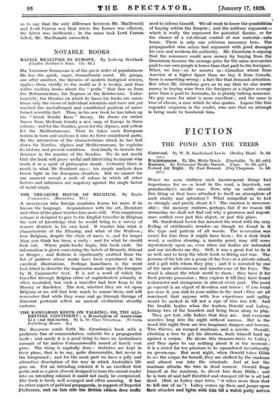THE KANGAROO KEEPS ON TALKING; OR, THE ALL- BRITISH CONTINENT
: a Dasicription of Australian Li e and Indistries. By L. St. Clare Grondona. (Victoria Publishing House. 3s.) Ma. BALDWIN sends forth Mr. Grondona's book with a prefatory line of commendation, suitable for a propagandist work ; and surely it is a good thing to have an Australian's account of his native Commonwealth issued at barely cost price. The thing is capitally done : statistics are kept in their place, that is to say, quite discoverable, but never in the foreground ; and for the most part we have a jolly and attractive description of the way in. which Australia's life goes on. For an intending colonist it is an excellent first guide, and as a piece of work designed to turn the casual reader into an intending colonist it could not easily be overpraised. The book is lucid, well arranged and often amusing. It has
its other aspect of political propaganda, in support of imperial "Freference, and on this side the -British eitisen does reallY need to inform himself. We all want to know the possibilities of buying within the Empire ; and the military argument—
which is really the argument for potential famine, or for the chance of a cut-throat control of raw material—outs home. There is only one criticism necessary here. The propagandist who mixes bad argument with good damages his case and weakens his authority. Mr. Grondona is arguing that the consumer could save money by buying from the Dominions because the average price for the same necessaries paid to our own people is lower than that paid to the foreigner. When we buy—as he assures us—Canadian wheat from America at a higher figure than we buy it from Canada, there is something wrong : a fact like that demands attention. But when Mr. Grondona goes-on to say that we also waste money in buying wine from the foreigner at a higher average price than is paid to Australia, he is plainly talking nonsense. We pay more for what is more excellent ; and the same is true of cheese, a case which he also quotes. Lapses like this engender suspicion in the reader, who sees that an attempt is being made to hoodwink him.










































 Previous page
Previous page